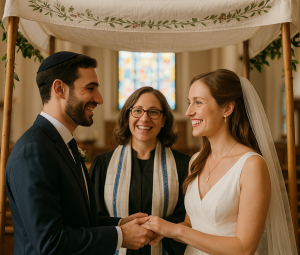Her Russian immigrant father was insistent: What kind of a career is writing for a nice Jewish girl?
Fortunately, Ruth Gruber paid him no heed and went on to become a foreign correspondent and the author of 19 books, including Exodus 1947 and Raquela: A Woman of Israel.
Gruber, now 98, is the subject of Bob Richman’s evocative biopic, Ahead of Time, which will be screened three times at the Toronto International Film Festival starting on Sept. 12.
The title of his 73-minute documentary, based on Gruber’s autobiography, Ahead of Time: My Early Years as a Foreign Correspondent, is most apt.
Gruber, an American who was born in Brooklyn, was a self-assured young woman who had no interest whatsoever in conforming to stereotypes. As the old adage goes, she did not want to be pregnant, barefoot and in the kitchen. And to Gruber, there was no such thing as a glass ceiling.
A rebellious, restless, adventurous and curious person, she was a feminist long before it was fashionable to be one.
The British novelist, Virginia Woolf, whom she knew quite well, once told her that women are perfectly capable of doing anything they set their minds to, and Gruber took her advice to heart.
Winning a fellowship to pursue her studies in Germany after graduating from the University of Wisconsin, Gruber waded into German philosophy, modern English literature and art history in Cologne.There she also witnessed Nazi rallies and listened to a fiery speech delivered by Adolf Hitler himself.
Before leaving Germany in 1932, a year before Hitler’s ascent to power as Germany’s chancellor, she acquired a PhD, the youngest person until then to have earned one. Later in the 1930s, while freelancing for the New York Herald Tribune, she became the first newspaper reporter to fly through Siberia into the Soviet Arctic.
During World War II, at the behest of U.S. Secretary of the Interior Harold Ickes, Gruber went to Alaska to gather material for a report she would write on the prospects of developing that future state for Americans after the war. In 1944, again for Ickes, she was assigned the task of bringing 1,000 Jewish refugees from Europe.
Returning to journalism in 1946, Gruber covered the newly created Anglo-American Committee of Inquiry on Palestine, whose mandate was to decide the fate of 100,000 Jewish refugees languishing in European displaced persons camps.
While covering this story, Gruber witnessed the arrival of the refugee ship Exodus in Haifa. The British authorities sent back the Jewish refugees to France, and from there, Gruber accompanied them to Germany.
En route to the port of Hamburg, Gruber wrote about and photographed the refugees. The Herald Tribune ran her dispatches and Life published her stark photographs.
The Exodus incident, she says in the film, was the high point of her life as a reporter. “That’s my story,” she says. “It had everything.”
In drawing a portrait of Gruber, Richman concentrates on her activities in the Soviet Union, Alaska, wartime Europe and Palestine and her friendship with the publisher of the Herald Tribune, who considered her something of a surrogate daughter.
For reasons best known to himself, Richman does not venture beyond her reporting stints in Europe and the Middle East, neglecting to tell us about her subsequent assignments in Israel and Ethiopia. Richman informs us that Gruber got married and had children, but strangely enough, he leaves out the details completely.
Nonetheless, Ahead of Time remains an interesting film about a spunky and engaging woman.
***
Ahead of Time will be screened on Saturday, Sept. 12 at 1 p.m. at the Scotiabank Theatre, Tuesday, Sept. 15 at 4:45 p.m. at the Israel Bader Theatre and Wednesday, Sept. 16 at 1:30 p.m. at Jackman Hall, Art Gallery of Ontario.






